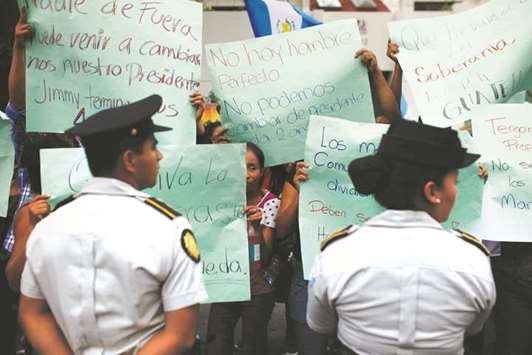Scandal has come to haunt Morales, a former television comedian, less than two years after he took office on promises to stamp out the corruption that led to the toppling of his elected predecessor.
Morales sparked international criticism on Sunday when he ordered the expulsion Ivan Velasquez, head of the UN International Committee Against Impunity in Guatemala (CICIG).
A grouping of 80 Latin American civil society organisations condemned the move, in a statement published on Monday by the Due Process of Law Foundation.
Morales’s move “strongly suggests that he seeks to block the criminal investigation into his alleged activity, in addition to shielding members of illegal security forces and clandestine security structures that are currently under investigation”, they said.
Morales said on Sunday that he ordered Velasquez, a Colombian national, to be expelled from Guatemala “for the good of the country and not for personal motives”.
“He meddled in domestic affairs that are the sole responsibility of the Guatemalan state” and “tried to pressure lawmakers to pass constitutional reforms”, Morales said.
The Constitutional Court however temporarily suspended Morales’s order, its chairman Francisco Mata told reporters.
Health Minister Lucrecia Hernandez and her three deputies resigned in protest over Morales’s move.
UN Secretary General Antonio Guterres was “shocked” by Morales’s move, his spokesman Stephane Dujarric said in a statement.
The UN human rights chief said yesterday that he was “disturbed” by the decision of Guatemala’s president to expel Velasquez.
“I am deeply disturbed by the unprecedented decision of the president of Guatemala,” Zeid Ra’ad al-Hussein said in a statement. “I call on the Guatemalan government to allow CICIG to carry out its work unimpeded and to take steps to guarantee the protection of human rights defenders, judicial officials, including the attorney general and high court judges, as well as CICIG’s staff.”
Velasquez and CICIG, together with the office of Attorney General Thelma Aldana, play a critically important role in the fight against corruption and impunity, al-Hussein said.
The Geneva-based International Commission of Jurists (ICJ) said that failure to comply with the Constitutional Court ruling could constitute “obstruction of justice”, a criminal offence.
“The president´s decision to declare Ivan Velasquez as ‘non grata’ and ordering his immediate removal from the country is in clear breach of international law,” the ICJ said in a statement.
The United States, Britain, Canada, France, Germany, Italy, Spain, Sweden and Switzerland jointly condemned the move, in a joint statement issued by their embassies in Guatemala City.
The government said at a cabinet meeting on Monday that Morales retained the support of his remaining ministers.
An army spokesman said on Sunday that the force remained loyal to Morales.
But there was anger on the streets.
Dozens of demonstrators from indigenous, rural and student groups rallied in the historic centre of Guatemala City on Monday calling for him to resign.
“The president wants to guarantee impunity by avoiding criminal prosecution for illicit finance. It is shameful,” said Andrea Ixchiu, an activist from the indigenous area of Totonicapan.
“All those who have been accused of corruption have joined together to get rid of Ivan Velasquez,” said Alvaro Montenegro, an activist from the anti-corruption protest movement Justice Now.
Guatemala’s chief human rights attorney Jordan Rodas told reporters that Morales’s approach risked causing “a situation where it is impossible to govern”.
Some groups came out in support of the president and against foreign interference.
Many politicians in Guatemala consider the foreign-led body, which is unusual among UN bodies for its powers to bring cases to prosecutors, to be a violation of national sovereignty.
The protests raised the prospect of a fresh wave of unrest like the one that broke out against then-president Otto Perez in 2015.
The CICIG helped prosecutors investigate the corruption scandal that toppled Perez.
Morales won the subsequent elections and took over as president the following year.
Now investigators say he is suspected of failing to declare electoral campaign funds.
They estimate the value of the suspect transactions at about $1.0mn.
On Friday, Velasquez and Guatemalan prosecutors had applied to strip Morales of his immunity so he can be probed over the payments linked to his party, the National Convergence Front.
Morales became famous for his performance as Neto, a naive bumpkin, in his television show Moralejas.
He produced the show along with his brother Samuel, who has since been caught up in fraud allegations.
The future president insisted during campaigning that he was “neither corrupt nor a thief”.

